臨床検査部
- Home
- 臨床検査部
患者さんへ
ごあいさつ
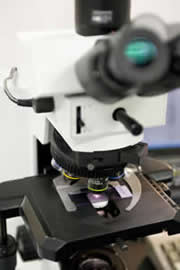
臨床検査部は、平成19年の開院以来「急性期医療に対応した検査情報を迅速かつ正確に提供する」と、「患者さんに安全安心な検査技術の提供と検査情報をわかりやすく提供する」の2点を目標に掲げ、業務体制を構築しつつ実践してまいりました。
検体検査分野においては、外来検査の30分迅速報告体制、24時間緊急検査体制により、いつでも迅速に検査情報が提供できる体制を構築しております。
生理機能検査では、最新の検査機器を導入によって安全で質の高い検査を提供できる体制を構築しております。
また、このような検査体制の構築と同時に、検査を担当する私たち臨床検査技師は
常に最新の検査技術や臨床知識の習得を目的に学会や研修会に積極的に参加し研鑽しております。
今後も患者さんに安全安心な検査をわかりやすく提供できますよう検査スタッフが力を合わせてまいります。
臨床検査部 部長 桑原 朋和
臨床検査部の仕事
臨床検査の仕事は、大きく2つに分けられます。ひとつは血液や尿など体内から採取した検査材料を調べる「検体検査」、もうひとつは患者さんに直接触れて検査を行う「生理機能検査」です。その他、当院では外来採血業務を臨床検査部で行っています。
1.検体検査
検体検査には、血液検査、生化学検査、尿一般検査、感染症検査、細菌検査、輸血検査などがあります。
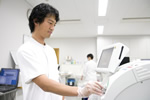
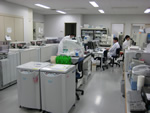
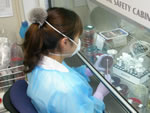
- 血液検査
赤血球数やヘモグロビン量などの貧血検査、白血球数や白血球分類などの検査をします。 - 生化学検査
血液中の成分を調べることで、栄養の状態や肝臓・腎臓・膵臓などの臓器の状態を知ることができます。 - 尿一般検査
尿中の成分から、糖尿病や腎臓の状態を調べます。その他、便潜血検査や寄生虫検査を行います。 - 感染症検査
B型肝炎やC型肝炎、梅毒、HIVなどに感染していないかを調べます。 - 細菌検査
喀痰や尿などの中にいる細菌の種類や薬の効き具合を調べます。また、インフルエンザやアデノなどのウィルス迅速検査を行います。 - 輸血検査
血液型や交差試験などの輸血に関わる検査をします。当院の輸血センターには、自己血液の採血室が設置されており、採血のサポートから検査・保管管理までを実施しています。
2.生理機能検査
生理機能検査には、心電図検査、呼吸機能検査、超音波検査、脳波検査、筋電図検査、聴力検査などがあります。
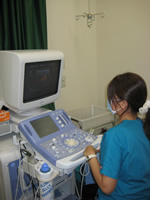
- 心電図検査
通常の安静時標準12誘導心電図の他、24時間記録するホルター心電図やトレッドミルを用いた負荷心電図などを行います。 - 呼吸機能検査
肺活量などの簡易肺機能検査や、特殊なガスを用いた精密肺機能検査を行います。 - 超音波検査
腹部超音波では肝臓や腎臓などの臓器の状態を画像で調べます。表在超音波では頸動脈の状態を見たり甲状腺・乳腺の病気を見つけます。心臓超音波では心臓の動きを検査します。 - 脳波検査
脳から発生する微弱な電気を調べることで、睡眠の状態や脳の病気を知ることができます。 - 筋電図検査
筋肉の状態や末梢神経の刺激伝達の状態を調べます。 - 聴力検査
どのくらい小さな音まで聞こえるかを測定したり、言葉の聞き取り能力などを調べます。
3.外来採血
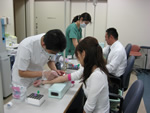
原則的に、未就学児を除く全外来患者さんの採血を、外来採血室にて行っています。また、採血室では通常採血の他に、糖負荷試験や出血時間などの検査や24時間蓄尿の方法についての説明なども行っています。
チーム医療について
1.糖尿病教室
当院では、医師や看護師をはじめ私たち臨床検査技師などの多職種でチームを組み、連携を取りながら糖尿病の治療や教育活動を行っています。臨床検査技師は、糖尿病教室において糖尿病に関する検査や医学的な知識、自己血糖測定装置(SMBG)の使い方などを説明し、自己管理の支援をしています。
2.感染対策チーム(ICT)
院内における感染を監視するチームで、薬剤耐性菌(MRSAなど)の発生状況や感染源の調査、院内ラウンドによる環境確認などを多職種がチームで活動しています。臨床検査技師は、薬剤耐性菌発生の状況把握や発生源調査のための培養検査、院内ラウンドなどで専門性を生かしながら参加しています。
3.栄養サポートチーム(NST)
栄養管理が必要な患者さんに対し、多職種で構成されたチームで栄養支援を行っています。臨床検査技師は、検査データに基づいた栄養状態のモニタリングやサポートを必要とする患者さんの抽出、カンファレンスでの検査情報の提供などの活動を通じて治療・支援に参加しています。
各種認定について
臨床検査部のすべてのスタッフは、国家資格を有する臨床検査技師ですが、
さらに専門の知識・技術を習得して認定資格を取得しているスタッフが、高度で安全な検査を提供しています。
| 緊急臨床検査士 | 15名 | 超音波検査士(体表臓器領域) | 5名 |
| 認定輸血検査技師 | 2名 | 超音波検査士(循環器領域) | 7名 |
| 二級臨床検査士(神経生理学) | 1名 | 超音波検査士(消化器領域) | 9名 |
| 二級臨床検査士(臨床化学) | 2名 | 超音波検査士(泌尿器領域) | 2名 |
| 二級臨床検査士(血液学) | 2名 | 認定一般検査技師 | 1名 |
| 二級臨床検査士(微生物学) | 4名 | 尿沈渣検査士 | 1名 |
| 二級臨床検査士(病理学) | 5名 | 聴力測定技術講習修了者 | 1名 |
| 二級臨床検査士(血清学) | 1名 |
医療関係者の方へ
臨床検査技師の皆さまへ
臨床検査部の概要
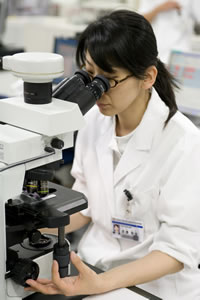
1.スタッフ構成
当院の臨床検査部には37名の臨床検査技師と2名の事務員が従事しており、採血室および検体系検査は検査技師18名と事務員1名、生理検査は検査技師18名と事務員1名、管理者1名で構成されています。また、院内には臨床検査部の他に臨床検査技師が、リプロダクション室に3名、病理診断科に5名従事しています。
2.勤務体制
勤務は、日勤(A勤)と夜勤(BC勤)の組み合わせによる変則2交替制で、平日の日勤以外は2名体制で運用されています。
3.業務内容
- ● 外来採血業務(原則として、未就学児を除く全外来患者対象)
- ● 検体検査(生化学、血液、一般、感染症、腫瘍マーカー、甲状腺マーカー、心筋マーカー、血中薬物等)
- ● 細菌検査(細菌培養同定、薬剤感受性、各種ウィルス迅速検査、エンドトキシン、β-Dグルカン、結核菌PCR検査等)
- ● 輸血検査(輸血製剤管理、血液型、交差試験、自己血採血介助等)
- ● 生理検査(循環器検査、呼吸機能、各種超音波、脳波、筋電図、平行聴覚検査等)
- ● 手術室業務(緊急検査、輸血製剤管理、神経系検査、循環器検査等)
- ● 心カテ室業務(カテ介助、下肢超音波等)
学生の方々へ
当院では、臨床検査技師養成校からの臨地実習生の受入を行っています。部門毎にシラバスが作成されており、能率的に実習を行うことができます。また、実習には他のコメディカル部門における見学実習も組み込まれており、体外受精やMRIなど幅広い知識が習得できます。
